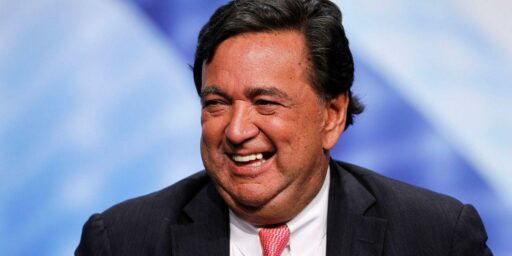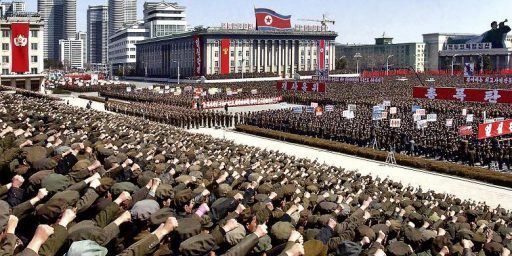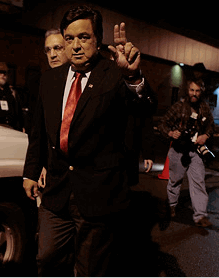Bill Richardson’s New Realism
Foreign Affairs has, over the last several issues, had one major Republican and one major Democrat publish an essay under their name outlining the foreign policy agenda they would pursue if elected president. Bill Richardson was either tired of waiting or figured he wouldn’t be asked, so instead published his in the latest issue of The National Interest.
Stripping out (most of) the platitudes, here are the highlights of “A New Realism for a New Century: Presidential Candidate Bill Richardson Outlines His Foreign Policy Agenda.” (It’s completely UFO-free, by the way.)
The problems of the 21st century are not the problems of a nation: they are the problems of an interdependent global society.
Well, the problems are action the problems of several nations. For whomever is elected president, though, this nation is the one that matters. What Richardson should instead say is that the solutions are not in the hands of a single nation but rather require the cooperation of many nations.
The world’s only superpower must lead that global society if we are to respond effectively to common challenges. We must reject the fantasies of those who advocate retreat from global engagement, just as we must reject the delusion of those who claim we can transform other countries through the unilateral application of American military power. We also must go beyond the balance-of-power realism of the last century and embrace a New Realism that understands that to exercise power effectively in the 21st century we must rise to a new level of global leadership.
Okay, this is pure platitude. Basically, he wants to be incredibly engaged while simultaneously rejecting unilateralism while keeping the option of unilateralism open.
[E]nd the Iraq war, rapidly and responsibly. Every day we remain mired in Iraq, we tie our own hands, and others are reminded of the dishonesty and incompetence that got us there. We need to recognize that there is no military solution to Iraq’s political impasse, and that only our military withdrawal can break the stalemate and open up new political possibilities. We need to bring our troops out as we launch a diplomatic surge—a new political strategy that engages all the Iraqi factions and all the nations of the region, as well as the international donor community.
Transforming American imperialism, we might call it.
We must repair our alliances. We must restore respect for our allies, and for the democratic values that unite us. The next president needs to make it clear, through words and deeds, that we value our alliances and are committed to strengthening them. We should always prefer multilateral efforts that unite us and share burdens, but if we choose to act alone, we should not accuse our allies of disloyalty or cowardice.
Shorter Bill Richardson: We should continue the Bush Administration’s foreign policy but hire new speechwriters.
We must engage our adversaries diplomatically. The Bush Administration’s refusal to engage obnoxious regimes has only encouraged and strengthened their most paranoid and hard-line tendencies: Iran and North Korea responded to Washington’s snubs and threats with intensification of their nuclear programs. We need to talk tough to such regimes, but to do so, we need to talk.
Well, we’re talking now, just behind the scenes rather than publicly. But, yes.
With Russia, our first priorities should be securing loose nukes and putting pressure on Iran to halt nuclear enrichment. With China, our priorities should be North Korea, Darfur and trade.<
Aren’t those our priorities now? Except maybe Darfur?
[E]xpanding the Security Council to include Japan, Germany, India, a country from Latin America and a country from Africa as permanent members.
Umm, which countries from Latin America and Africa? They’re not interchangeable. And how does adding five permanent members make the UNSC more relevant? It’s already virtually useless as an action body because of the unanimity requirement.
[I]ncreasing aid to poor countries and working with other donors to make sure they meet their Millennium aid commitments. It means more Third World debt relief, and trade agreements that create jobs in all countries, and that seriously address worker rights and the environment. It means an IMF more flexible on social safety nets.
Are we going to create more jobs or address worker rights and the environment? Those are conflicting goals, after all.
We must respect both the spirit and the letter of the Geneva conventions and we must join the International Criminal Court, and support it enthusiastically, so that those who would violate human rights know that they will be held accountable.
“Enthusiastically” is a bit much, I’m afraid. Indeed, I can’t imagine the ICC getting 67 votes in the Senate.
We must lead international efforts to eradicate slavery, and we must lead on genocide, especially in Africa, where the two most recent genocides have taken place, in Rwanda and now in Darfur. History teaches us that if the United States does not take the lead on genocide, no one else will.
Right. But what does “taking the lead” mean, exactly?
The United States must lead global efforts to reduce greenhouse gas emissions. This means joining the Kyoto protocol and then going well beyond it, with a man-on-the-moon effort to improve efficiency and to commercialize clean, alternative technologies. We must cut our fossil fuel consumption dramatically and rapidly, and get others, including China and India, to follow us to a sustainable energy future.
The domestic side of this could well happen with strong leadership. India and China aren’t ready to turn that corner just yet, though.
We must increase funding for the Nunn-Lugar program, and we need better human and international intelligence and law enforcement coordination to prevent nuclear trafficking. We must do the hard diplomatic work to unite the world, including Russia and China, to stop the nuclear ambitions of Iran and North Korea, as we provide these nations with incentives to renounce nuclear weapons.
The incentives in the other direction are mighty powerful, I’m afraid. But, yes, worth trying.
We must work with all moderate Muslims worldwide to present the Muslim world with a better vision than the apocalyptic fantasy of the jihadists. Undoing the damage to our image caused by Bush Administration policies will require a major new public diplomacy effort. But for this to be credible, we also need to change the policies: We need to live up to our own ideals. Prisoner abuse, torture, secret prisons, renditions and evasion of the Geneva conventions must have no place. If we want Muslims to open to us, we should start by closing Guantánamo.
I’d point out that we weren’t doing any of those things before 9/11 and were still attacked. Ipso facto, then, this won’t solve the problem. It’s worth doing for its own sake, though, so why not.
And we must re-engage the Middle East peace process, so that we can deprive the jihadists of their most effective propaganda tool. We must use all our sticks and carrots to strengthen Palestinian moderates and to promote a two-state solution that guarantees Israel’s security.
This has been our policy for quite some time. Remember, though, al Qaeda was attacking us during the most active days of the Clinton Administration’s engagement in Oslo and other initiatives in this direction.
We must recruit, equip and train more first responders, and we must drastically improve the surge capacity of our public health facilities, which six years after 9/11 are not ready for a biological attack. We need to allocate Homeland Security dollars to where they are needed—to the population centers and facilities that we know Al-Qaeda targets.
Almost certainly a monumental waste of resources.
The United States also needs to start paying attention to the Americas.
When, precisely, did we stop?
We need better border security and comprehensive immigration reform. To reduce both illegal immigration and anti-American populism in Latin America, we must work with reform-minded governments to alleviate poverty, promote equitable development and strengthen energy cooperation.
Does this involve a magic wand of some sort?
We should encourage expanded use of generic drugs, and we should stimulate public-private partnerships to enhance access to HIV anti-viral and anti-malarial drugs, as well as low-tech but effective methods like bed nets.
We need the United States government to hand out mesh in the 3rd World?
America should spearhead a multilateral Marshall Plan to promote development in Afghanistan, the Middle East and Africa. For a small fraction of the cost of the Iraq War, which has made us so many enemies, we could make many friends. A crucial effort in fighting terrorism must be support for public education in the Muslim world, which is the best way to mitigate the role of those madrasas that foment extremism. Development alleviates the injustice and lack of opportunity that proponents of violence and terrorism exploit.
While replacing military imperialism with economic imperialism might be well-intentioned, it’s highly unlikely to have the positive impact Richardson imagines.
Ultimately, Richardson’s “New Realism” has much in common with Bush’s “Neo-Conservatism.” Most notably, both use variants of “new” to negate the noun they modify. Whatever one might think of Richardson’s proposals, one thing is for sure: They ain’t Realist.






We’ve seen this before at the Harvard International Review a couple of months back. You posted on it at the time.
It will certainly open up new possibilities. Can he explain how any of them can be beneficial to the US?
I realized this after the fact. It appears to be a different piece, though, outlining the same basic vision.
Well someone seems to be having a bad day. All you offer us here James, is a collection of wise-acre, one-liners that show no intellectual effort whatsoever. I know you can do better.
“What Richardson should instead say is that the solutions are not in the hands of a single nation but rather require the cooperation of many nations.”
And why would he say that? Unless the problems that the solutions address are common problems shared by interconnected societies, which is what he said.
“Basically, he wants to be incredibly engaged while simultaneously rejecting unilateralism while keeping the option of unilateralism open.”
Yeah, and so? Multilateral engagement, with unilateralism reserved, as always, if absolutely necessary. You seriously think this is the same as the Bush approach?
“Transforming American imperialism, we might call it.”
If you wish to define imperialism as any non-isolationist strategy, then fine. Call it that if you want. But shifting the balance between using hard and soft power toward a more sensible mix is certainly a different path than the one we are on now.
“Shorter Bill Richardson: We should continue the Bush Administration’s foreign policy but hire new speechwriters.”
This is so lame. Every point he lists in this paragraph is a marked departure from Bush administration policy. You seem to be trying to argue that unless a candidate adopts a Paulian isolationism, then its really the Bush policies that they will follow. I actually find this quite stunning. I know that you are engaged enough in foreign policy issues to know better.
“Well, we’re talking now, just behind the scenes rather than publicly.’
After over 6 years of refusing to do so.
“With Russia, our first priorities should be securing loose nukes…
Aren’t those our priorities now?”
So what have we accomplished in 6+ years on this issue? Please tell Sam Nunn – he is dying to know too.
“Are we going to create more jobs or address worker rights and the environment? Those are conflicting goals, after all.”
huh? How are they conflicting goals? The clean technologies necessary for an improved environment will probably be one of the major growth industries of the century. And worker’s rights conflict with job growth? Hello,,,didnt we go through this argument about a century ago in this country?
Here is a hint, James. When worker’s rights are protected, one has the conditions in place to grow a middle class, which in turn opens up enormous markets for further growth.
“Right. But what does “taking the lead†mean, exactly? ”
I guess you Republicans are really ready for retirement if you need to ask that question. How about 1) put it on the global agenda. 2) demand action from international organizations 3) use economic leverage to directly affect the conditions, and /or to incentivise alliances to address the issues. Y’know, the kind of stuff we used to do.
“India and China aren’t ready to turn that corner just yet, though.”
Oh, so we should just sit around and way till they are? Or maybe try to entice them forward?
“I’d point out that we weren’t doing any of those things before 9/11 and were still attacked. Ipso facto, then, this won’t solve the problem.”
We were attacked by 19 guys with boxcutters. From a movement that was much smaller than it is now. So yeah, his approach will not eradicate every last person with terroristic tendencies. But it does move in the right direction.
“The United States also needs to start paying attention to the Americas.
When, precisely, did we stop?”
Around 10AM Eastern time, 11 September, 2001.
“We need the United States government to hand out mesh in the 3rd World?”
Yeah, aint it a riot!! Ha Ha. Helping a few million people avoid malaria, for a pittance of cost. What a comedian this Richardson!
“Ultimately, Richardson’s “New Realism†has much in common with Bush’s “Neo-Conservatism.—
They would both be foreign policies of the United States of America. Beyond that, I see almost no similarities whatsoever.
Well said Tano! Well said.
I second Expat Teacher – WELL SAID Tano!!!!